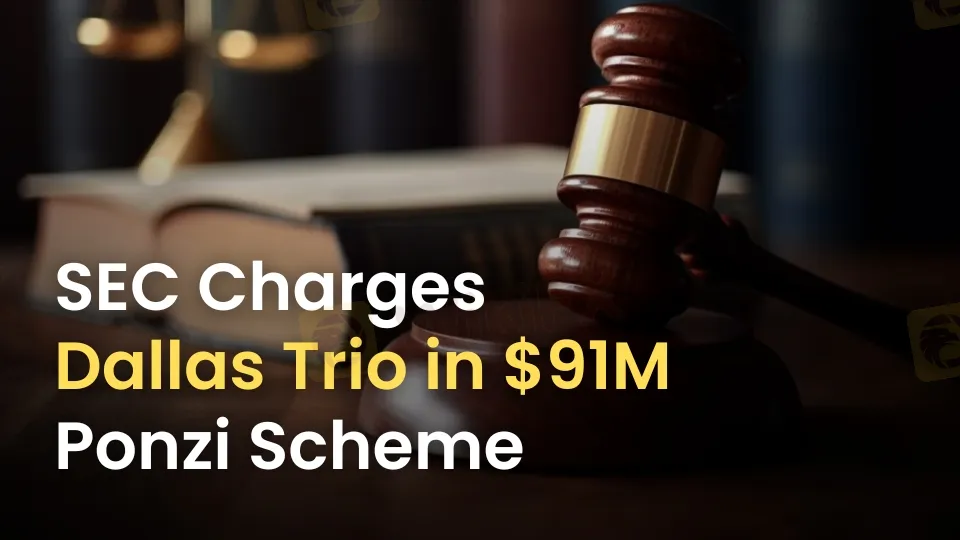简体中文
繁體中文
English
Pусский
日本語
ภาษาไทย
Tiếng Việt
Bahasa Indonesia
Español
हिन्दी
Filippiiniläinen
Français
Deutsch
Português
Türkçe
한국어
العربية
SEC Charges Dallas Trio in $91M Ponzi Scheme Defrauding Investors
Abstract:The SEC charges Kenneth W. Alexander, Robert D. Welsh, and Caedrynn E. Conner for running a $91M Ponzi scheme, promising false returns and misappropriating funds.

The U.S. Securities and Exchange Commission (SEC) has charged three Dallas-Fort Worth residents—Kenneth W. Alexander II, Robert D. Welsh, and Caedrynn E. Conner—with running a massive Ponzi scheme that swindled over 200 investors out of at least $91 million. The fraudulent operation, spanning May 2021 to February 2024, promised lucrative returns but delivered devastating losses.
The SEC alleges that Alexander and Welsh masterminded the scam through the Vanguard Holdings Group Irrevocable Trust (VHG), a supposed powerhouse in international bond trading. They lured investors with “guaranteed monthly returns of between 3% and 6%” and assurances that principal investments would be repaid after 14 months. However, the SEC claims VHG was a sham with no real revenue, propped up by Ponzi-style payments using new investors money.
Caedrynn E. Conner played a key role by funneling over $46 million into VHG through his own entity, the Benchmark Capital Holdings Irrevocable Trust. Together, the trio peddled a fake financial product called a “pay order,” marketed as a safeguard against losses, but the SEC says it was worthless. Instead of generating profits, Alexander and Conner allegedly siphoned off millions for personal gain, including Conners lavish $5 million home purchase.
Sam Waldon, Acting Director of the SEC‘s Division of Enforcement, condemned the scheme: “As we allege, the defendants conducted a large-scale Ponzi scheme that caused devastating losses to investor victims, while Alexander and Conner misappropriated millions of dollars of investor funds.” He reaffirmed the SEC’s resolve to pursue justice for defrauded investors.
Filed in the U.S. District Court for the Eastern District of Texas, the SEC‘s complaint accuses the trio of violating federal securities laws’ antifraud and registration rules. The agency is pushing for permanent injunctions, repayment of illicit profits with interest, and hefty civil penalties to hold them accountable.
This case underscores the dangers of Ponzi schemes masquerading as legitimate investments. Investors were drawn in by bold promises of steady returns and security, only to see their savings vanish. The SECs action serves as a stark reminder to scrutinize too-good-to-be-true opportunities in the financial world.

Disclaimer:
The views in this article only represent the author's personal views, and do not constitute investment advice on this platform. This platform does not guarantee the accuracy, completeness and timeliness of the information in the article, and will not be liable for any loss caused by the use of or reliance on the information in the article.
Read more

Binance Users Convert Crypto and Withdraw Instantly to Mastercard
Binance now lets users in Europe effortlessly convert crypto and instantly withdraw fiat to Mastercard using the new Buy & Sell service with seamless integration.

Philippine SEC Blocks Unregistered Crypto Exchanges ISPs Nationwide
Philippine SEC enforces new CASP Rules, prompting major ISPs to block access to unregistered crypto exchanges and raising concerns on internet censorship.

TradexMarkets: 5 Troubling Signs You Shouldn’t Ignore
Stop! Read this article if you're thinking about using TradexMarkets. There are several warning signs that suggest this broker may not be safe. Check out this article to find out why. Be safe.

Thinking of Investing in TD Ameritrade? Here’s What May Shock You
Experienced both highs and lows with TD Ameritrade in terms of trading experience and customer support? You’re not alone! From humble beginnings to losses and poor experiences, TD Ameritrade has turned out to be a shocking surprise for traders trusting it for wealth creation. The fraudulent broker has moved into the bad books of traders, quickly erasing pleasant memories they had at the beginning. Read on to learn more about it.
WikiFX Broker
Latest News
D. Boral Capital agrees to a fine as a settlement with FINRA
Beware of Fake RS Finance: How to Spot Scams
Fortune Wave Solution: SEC Warns of Investment Scam
Is TD Ameritrade Safe? How to Spot Fake URLs and Stay Protected
Engineer Loses RM230,000 in “Elite Group” Investment Scam
Is Learning Forex Trading Online a Good Idea? Pros and Cons Explained
TradexMarkets: 5 Troubling Signs You Shouldn’t Ignore
A Guide to Buy Stop vs Buy Limit in Forex Trading
SEC Implements New Rules for Crypto-Asset Service Providers
Investment Scam Alert: FCA Identifies 15 Scam Brokers
Currency Calculator



